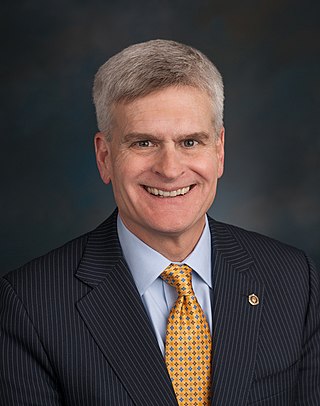Related Research Articles

Randy Evan Barnett is an American legal scholar. He serves as the Patrick Hotung Professor of Constitutional Law at Georgetown University, where he teaches constitutional law and contracts, and is the director of the Georgetown Center for the Constitution. After graduating from Northwestern University and Harvard Law School, he tried many felony cases as a prosecutor in the Cook County States’ Attorney's Office in Chicago. A recipient of a Guggenheim Fellowship in Constitutional Studies and the Bradley Prize, Barnett has been a visiting professor at Penn, Northwestern and Harvard Law School.
The Contract with America was a legislative agenda advocated for by the Republican Party during the 1994 congressional election campaign. Written by Newt Gingrich and Dick Armey, and in part using text from former President Ronald Reagan's 1985 State of the Union Address, the Contract detailed the actions the Republicans promised to take if they became the majority party in the United States House of Representatives for the first time in 40 years. Many of the Contract's policy ideas originated at The Heritage Foundation, a conservative think tank.

Paul Davis Ryan is an American former politician who served as the 54th speaker of the United States House of Representatives from 2015 to 2019. A member of the Republican Party, he was the vice presidential nominee in the 2012 election running alongside Mitt Romney, but lost to incumbent president Barack Obama and then-vice president Joe Biden.

James Warren DeMint is an American lobbyist, businessman, author, and retired politician who served as a United States Senator from South Carolina and as president of the Heritage Foundation. DeMint is a member of the Republican Party and a leading figure in the Tea Party movement; he is also the founder of the Senate Conservatives Fund.

Patrick Joseph Tiberi is an American lobbyist and politician who served as the U.S. representative for Ohio's 12th congressional district from 2001 to 2018. His district included communities north and east of Columbus. He is a member of the Republican Party, and previously served in the Ohio House of Representatives from 1993 to 2000. He briefly served as Chair of the new Republican Main Street Congressional Caucus from September 7, 2017.

John Andrew Boehner is an American retired politician who served as the 53rd speaker of the United States House of Representatives from 2011 to 2015. A member of the Republican Party, he served 13 terms as the U.S. representative for Ohio's 8th congressional district from 1991 to 2015. The district included several rural and suburban areas near Cincinnati and Dayton.
A balanced budget amendment is a constitutional rule requiring that a state cannot spend more than its income. It requires a balance between the projected receipts and expenditures of the government.

William Morgan Cassidy is an American physician and politician serving as the senior United States senator from Louisiana, a seat he has held since 2015. A member of the Republican Party, he served in the Louisiana State Senate from 2006 to 2009 and in the U.S. House of Representatives from 2009 to 2015.

Joseph John Heck is an American physician and politician who served as the United States representative for Nevada's 3rd congressional district from 2011 to 2017. Heck is a United States Army major general and a board-certified physician who previously served as a Nevada state senator from 2004 to 2008. He ran for the United States Senate in 2016, losing to Catherine Cortez Masto.
The Tea Party movement was an American fiscally conservative political movement within the Republican Party that began in 2009. Members of the movement called for lower taxes and for a reduction of the national debt and federal budget deficit through decreased government spending. The movement supported small-government principles and opposed government-sponsored universal healthcare. The Tea Party movement has been described as both a popular constitutional movement and as an "Astro Turf operation" purporting to be spontaneous and grassroots, but created by hidden elite interests. It was composed of a mixture of libertarian, right-wing populist, and conservative activism. It has sponsored multiple protests and supported various political candidates since 2009. According to the American Enterprise Institute, various polls in 2013 estimated that slightly over 10% of Americans identified as part of the movement.

Larry Dean Bucshon is an American politician and physician who has been the U.S. representative for Indiana's 8th congressional district since 2011. He is a member of the Republican Party.

Richard B. "Rich" Nugent is an American retired law enforcement officer and former United States Congressman. He is a member of the Republican Party. He is a former Sheriff of Hernando County, Florida. On November 2, 2010, Richard Nugent defeated Democratic nominee James Piccillo, to replace retiring Congresswoman Ginny Brown-Waite. Nugent was a member of the Tea Party Caucus. On November 2, 2015, Nugent announced he would not seek reelection.
The Pledge to America is a list of proposed legislative items that the Republican Party promised to pursue in the 112th Congress if Republicans gained a majority of the seats in the U.S. House of Representatives in the November 2010 election. The Pledge to America was written by Rep. Kevin McCarthy's staffer Brian Wild at the behest of House Republican leaders. The Pledge to America was publicly released on September 23, 2010, at a hardware store in Sterling, Virginia.

The Path to Prosperity: Restoring America's Promise was the Republican Party's budget proposal for the Federal government of the United States in the fiscal year 2012. It was succeeded in March 2012 by "The Path to Prosperity: A Blueprint for American Renewal", the Republican budget proposal for 2013. Representative Paul Ryan, Chairman of the House Budget Committee, played a prominent public role in drafting and promoting both The Path to Prosperity proposals, and they are therefore often referred to as the Ryan budget, Ryan plan or Ryan proposal.
The 2011 United States debt-ceiling crisis was a stage in the ongoing political debate in the United States Congress about the appropriate level of government spending and its effect on the national debt and deficit. The debate centered on the raising of the debt ceiling, which is normally raised without debate. The crisis led to the passage of the Budget Control Act of 2011.
The proposed Cut, Cap and Balance Act of 2011 was a bill put forward in the 112th United States Congress by Republicans during the 2011 U.S. debt ceiling crisis. The provisions of the bill included a cut in the total amount of federal government spending, a cap on the level of future spending as a percentage of GDP, and, on the condition that Congress pass certain changes to the U.S. Constitution, an increase in the national debt ceiling to allow the federal government to continue to service its debts.

The Budget Control Act of 2011 is a federal statute enacted by the 112th United States Congress and signed into law by US President Barack Obama on August 2, 2011. The Act brought conclusion to the 2011 US debt-ceiling crisis.

Mark Randall Meadows is an American politician who served as the 29th White House chief of staff from 2020 to 2021. A member of the Republican Party, he also served as the U.S. representative for North Carolina's 11th congressional district from 2013 to 2020. During his legislative tenure, Meadows chaired the Freedom Caucus from 2017 to 2019. He was considered one of President Donald Trump's closest allies in Congress before his appointment as chief of staff.
The 2014 United States federal budget is the budget to fund government operations for the fiscal year (FY) 2014, which began on October 1, 2013 and ended on September 30, 2014.

Rodney Leland Blum is an American businessman and politician who served as the U.S. representative for Iowa's 1st congressional district from 2015 to 2019. A member of the Republican Party, he was first elected in 2014 and won a second term in the 2016 elections. Blum was defeated for reelection in 2018 by Democrat Abby Finkenauer. He has described himself as a member of the Tea Party movement.
References
- 1 2 Becker, Bernie (April 15, 2010). "A Revised Contract for America, Minus 'With' and Newt". The New York Times. p. A19. Retrieved September 18, 2010.
- ↑ Davis, Teddy (February 9, 2010). "Tea Party Activists Craft 'Contract from America'". ABC News. American Broadcasting Company. Retrieved September 18, 2010.
- ↑ Davis, Teddy (April 15, 2010). "Tea Party Activists Unveil 'Contract from America'". ABC News. Retrieved June 7, 2011.
- ↑ Davis, Teddy (April 15, 2010). "Tea Party Activists Unveil 'Contract from America'". ABC News. Retrieved September 15, 2010.
- ↑ Contract From America Web Site.
- ↑ Weigel, David (April 30, 2010). "Why Republicans Aren't Signing the Contract From America". David Weigel. The Washington Post Company.
- ↑ "The Contract from America: Complete List of Signatories Running for U.S. Congress or Governor" . Retrieved September 18, 2010.
